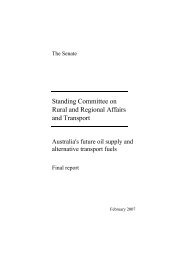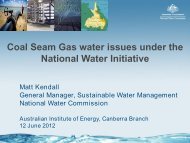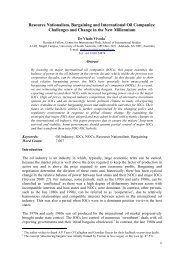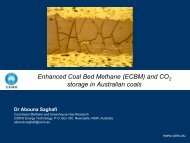Jun 2007 - Australian Institute of Energy
Jun 2007 - Australian Institute of Energy
Jun 2007 - Australian Institute of Energy
You also want an ePaper? Increase the reach of your titles
YUMPU automatically turns print PDFs into web optimized ePapers that Google loves.
The Darwin Declaration<br />
After two days <strong>of</strong> meetings, the eighth APEC <strong>Energy</strong> Ministers’<br />
Meeting in Darwin concluded on 30 May <strong>2007</strong> with the release<br />
<strong>of</strong> the ‘Darwin Declaration’, recognising the need to deploy<br />
cleaner, more efficient and sustainable energy technologies.<br />
“This is a landmark achievement for the APEC member<br />
economies, said Industry Minister and Chair <strong>of</strong> the meeting,<br />
Ian Macfarlane.<br />
“<strong>Energy</strong> Ministers from across the 21 economies have agreed<br />
to a number <strong>of</strong> ways forward to achieve energy security and<br />
sustainable development.<br />
A summary <strong>of</strong> the agreed instructions to APEC member<br />
countries follows.<br />
ACHIEVING OIL SECURITY<br />
APEC oil import dependency is forecast to rise from 36%<br />
in 2002 to 52% in 2030. Recent high oil prices have been<br />
driven by supply-demand fundamentals, geopolitical risks<br />
and concerns about supply interruption and speculative<br />
trading. In response we encourage APEC economies to adopt<br />
a broad range <strong>of</strong> measures designed to enhance security <strong>of</strong><br />
supply and promote fuel efficient transport and the uptake<br />
<strong>of</strong> viable alternative fuels.<br />
(a) Facilitating investment and trade in downstream<br />
and upstream oil markets<br />
To ensure sufficient investment in refining capacity to meet<br />
growing demand, including for cleaner fuels, we encourage<br />
APEC economies to:<br />
• provide a transparent and streamlined regulatory<br />
framework for such investment;<br />
• facilitate freer trade <strong>of</strong> oil products; and<br />
• create a positive environment for technology development<br />
to help refiners to produce cleaner oil products more<br />
efficiently.<br />
Transparent, credible, equitable, and effective legal and<br />
regulatory frameworks, including the ability to enforce<br />
contracts, are essential to generate sufficient and sustainable<br />
international upstream investment.<br />
• We support ongoing dialogue between consumers and<br />
producers to facilitate an enabling investment climate in<br />
oil and natural gas resources and reserves.<br />
• We recognise the importance <strong>of</strong> facilitating upstream<br />
investments.<br />
Observing the important role <strong>of</strong> oil and gas companies in<br />
APEC economies:<br />
• We encourage the <strong>Energy</strong> Working Group (EWG) to<br />
study the trade and investment practices <strong>of</strong> these oil and<br />
gas companies and to examine how partnerships and<br />
cooperation can improve the value chain.<br />
(b) Enhancing emergency preparedness<br />
Oil supply disruptions can affect all member economies.<br />
In response:<br />
• we encourage APEC economies to participate in the Real-<br />
Time Emergency Information Sharing System (RTEIS)<br />
and to develop and communicate emergency mechanisms<br />
and contingency plans, including through the APEC<br />
Taskforce for Emergency Preparedness and also through<br />
enhancing the RTEIS to facilitate the establishment <strong>of</strong><br />
an APEC Rapid Response Points <strong>of</strong> Contact Network<br />
for the Protection <strong>of</strong> Critical <strong>Energy</strong> Infrastructure to<br />
help minimise the potential for supply disruptions and to<br />
better protect critical energy infrastructure, including for<br />
maritime transportation;<br />
• we instruct the EWG to strengthen cooperation with other<br />
relevant international fora, such as the IEA, for coordinating<br />
efforts at the time <strong>of</strong> energy supply disruption;<br />
• we recognise the implications <strong>of</strong> disruptions and limitations<br />
to maritime energy transport and we instruct the EWG to<br />
develop linkages with organisations responsible for regional<br />
maritime security with a view to identifying and reporting<br />
any cross-cutting issues to our next meeting; and<br />
• we encourage interested economies to continue to report<br />
on implementing best practices for the establishment,<br />
financing and management <strong>of</strong> strategic oil stocks.<br />
(c) Improving oil data sharing<br />
A lack <strong>of</strong> transparent and reliable oil market data aggravates<br />
price volatility.<br />
• We reaffirm our support for the Joint Oil Data Initiative<br />
(JODI) as an international initiative that addresses investor<br />
uncertainty, contributes towards global harmonisation <strong>of</strong><br />
energy data, and strengthens producer and consumer<br />
dialogue by demonstrating concrete action.<br />
• We encourage APEC economies to report timely, accurate<br />
and complete data on oil reserves, supply and demand,<br />
stocks and production under the JODI. We direct the<br />
EWG to continue to provide training through JODI<br />
for economies to undertake this task and to contribute<br />
towards the JODI World Database.<br />
(d) Promoting energy efficient transport and<br />
alternative transport fuels<br />
Transportation is the leading sector for oil demand growth in<br />
the APEC region and high oil prices are driving cost-effective<br />
improvements in vehicle fuel efficiency and the development<br />
and uptake <strong>of</strong> alternative transport fuels.<br />
• We welcomed the report <strong>of</strong> the APEC Bi<strong>of</strong>uels Task Force.<br />
Among its key findings are that bi<strong>of</strong>uels from several crops<br />
are cost-competitive at current oil prices, that bi<strong>of</strong>uels<br />
can lower greenhouse gas emissions and that bi<strong>of</strong>uels<br />
can displace a sizeable share <strong>of</strong> oil use over time.<br />
• Bi<strong>of</strong>uels production should be advanced in line with<br />
sustainable development objectives. We encourage<br />
intensified efforts to develop and deploy techniques for<br />
the cost-effective use <strong>of</strong> non-food feedstocks, such as<br />
farm and forest residues and grasses, which hold the<br />
45 EnErgy nEws Vol 25 no. 2, <strong>Jun</strong>e <strong>2007</strong>

















